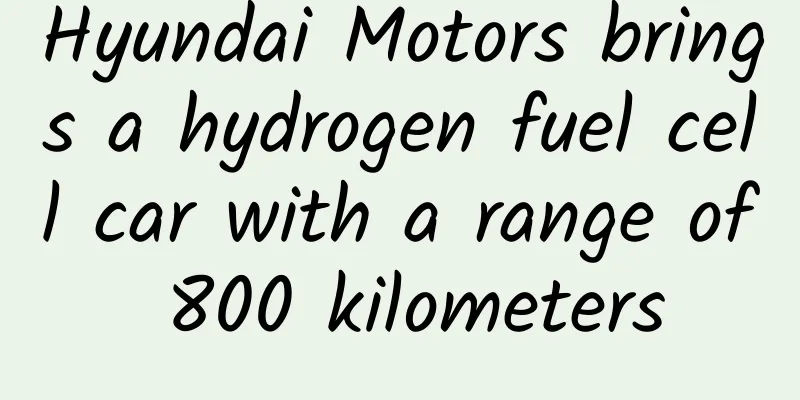Hyundai Motors brings a hydrogen fuel cell car with a range of 800 kilometers

|
It’s another CES Asia show, which is more like a small “Shanghai Auto Show”. This year, a total of 11 vehicle manufacturers gathered at the Shanghai New International Expo Center to showcase new concepts, new models and cutting-edge technologies. Among them are new car manufacturers such as Byton, Singularity, and Leapmotor, as well as old car companies that are constantly innovating such as Hyundai, Kia, Honda, Mercedes-Benz and SAIC-GM-Cadillac. The first day of the exhibition is a good time for participating automakers to announce their latest developments. Hyundai took this opportunity to announce two important cooperation plans: joining Baidu's Apollo platform and joining hands with AI technology newcomer DeepGlint. At the same time, it also exhibited its second-generation hydrogen fuel cell vehicle NEXO. What sparks can Hyundai and Baidu Apollo create? After joining Baidu's Apollo platform, Hyundai will carry out deeper cooperation with Baidu in the field of autonomous driving technology. The two parties did not reveal too many details. However, Leifeng.com New Intelligent Driving found that in the exhibition area outside the museum, a Hyundai new energy model IQNIQ with the words "Baidu Apollo" painted on the body was demonstrating autonomous parking and autonomous driving, but the vehicle is not yet available for exhibitors to experience. According to Leifeng.com New Intelligent Driving's observation, the autonomous driving capabilities of this car should be similar to those of Baidu Panda's autonomous driving shared cars. In fact, Hyundai started cooperating with Baidu as early as 2015, working together to develop navigation (Baidu Maps), car networking (CarLife), voice recognition and artificial intelligence (Duer OS) and other fields. This time, Hyundai has joined Baidu's Apollo open platform, and the cooperation between the two has officially extended to the field of autonomous driving. In addition, Hyundai has previously reached a cooperation with Silicon Valley newcomer Aurora on autonomous driving. Of course, in addition to seeking cooperation, Hyundai also has its own autonomous driving research and development plans. According to Li Zhenyu, general manager of Hyundai's autonomous driving development center, the autonomous driving technology they are currently developing includes sensor platforms, controller platforms and software architecture. The sensor platform is composed of relatively common cameras, radars and lidars; the controller platform includes a main controller and an auxiliary controller, which perform secondary detection of the surrounding environment in the three-dimensional world, and double-check the electronic control system that controls steering and acceleration and deceleration to ensure safety; in order to connect the sensor platform and the controller platform in series, an excellent autonomous driving software system is also needed. This is not Hyundai's strong point, so they chose to cooperate with Baidu Apollo for joint development. During this year's Pyeongchang Winter Olympics in South Korea, the hydrogen fuel cell vehicle NEXO equipped with Hyundai's autonomous driving technology has conducted autonomous driving road tests on highways and downtown areas. Leifeng.com's New Intelligent Driving learned that in the coming July, Baidu's Apollo platform will usher in an update to version 3.0, and a mass-producible low-speed campus autonomous driving solution will be officially released. We are very curious about what the autonomous driving system developed by Hyundai and Baidu Apollo will look like? Join hands with DeepGlint to explore the many possibilities of artificial intelligence This time, Hyundai also reached a cooperation with GreenVision, a Chinese artificial intelligence technology innovation company. Hyundai is interested in GreenVision's artificial intelligence ultra-high-definition camera image recognition technology. Hyundai hopes that this technology will help its brand develop new technologies, improve product quality, and understand customer demands in the Chinese market, thereby creating a brand space with a new customer experience and creating more diversified automotive industry innovations. It sounds a bit unrealistic. For example, in the future, modern offline experience stores will be equipped with Green Deep Vision's visual recognition cameras to analyze the behavior of visitors and use artificial intelligence to touch the real needs of users. Of course, it is still unclear how the cooperation between the two will be implemented. The latest generation of hydrogen fuel cell vehicle NEXO is unveiled with a range of 800 kilometers The last one to appear was of course the hydrogen fuel cell vehicle that Hyundai has always cherished. Under the general trend that most mainstream new energy vehicles use lithium-ion batteries, Hyundai has always had a special liking for its own fuel cell vehicles and has high expectations for them. It is understood that Hyundai's hydrogen fuel cell technology has developed to the fourth generation. The NEXO that appeared at the CES Asia booth this time is a model that uses Hyundai's latest generation of hydrogen fuel cells. It was first released in Seoul, South Korea in August last year. Hyundai and Aurora also plan to build an L4-level autonomous driving vehicle based on this model. One of the biggest highlights of this car is that its NEDC standard range can reach an astonishing 800 kilometers, which is 33% higher than the previous generation. In addition, the maximum power of NEXO's fuel cell stack is 120kW, which is the same as the same level of models using internal combustion engines. In addition, NEXO has overcome the problem of cold start and its durability has been greatly improved. Because its air intake system is equipped with high-performance air filtration equipment, NEXO can purify the air around the vehicle body on the basis of zero emission and zero pollution, which can be called a large mobile "air purifier". The most noteworthy question is when will this car be launched and how much will it cost? In the future, Hyundai also hopes to extend its fuel cell technology to cars, trucks and buses, and is very interested in China's public transportation service market. At this year's Pyeongchang Winter Olympics, Hyundai's hydrogen fuel cell buses have been demonstrated. As a winner of Toutiao's Qingyun Plan and Baijiahao's Bai+ Plan, the 2019 Baidu Digital Author of the Year, the Baijiahao's Most Popular Author in the Technology Field, the 2019 Sogou Technology and Culture Author, and the 2021 Baijiahao Quarterly Influential Creator, he has won many awards, including the 2013 Sohu Best Industry Media Person, the 2015 China New Media Entrepreneurship Competition Beijing Third Place, the 2015 Guangmang Experience Award, the 2015 China New Media Entrepreneurship Competition Finals Third Place, and the 2018 Baidu Dynamic Annual Powerful Celebrity. |
>>: Why the next O2O giant may be born in the incredible India
Recommend
Soy milk and milk, which one is more nutritious? How to choose?
Author: Yu Liang, registered nutritionist in Chin...
Who threw green paint on Kapibala? ? | Environmental Trumpet
AI discovers traces of endangered birds Although ...
Stellantis Group invests 11.6 billion to become a shareholder of Leapmotor and will establish a joint venture
NetEase Auto reported on October 26 that on Octob...
Does the "demon boy" Nezha have ADHD? You will understand everything after reading this!
In the hit movie Nezha: The Devil Boy Conquers th...
The "stumbling" robot dog died in just one hour...
To avoid predators, animals such as newborn giraf...
Headline money-making project, easily answer questions and earn pocket money every day
You should look for and see projects that can mak...
Stop saying you are “old” all the time, because you will really get older the more you say it!
Age is a natural sign with a biological basis. Ea...
Lovely owls? It turns out this mysterious species is not simple!
Owls have fascinated humans for thousands of year...
Android killer: iPhone 5C sales are good
Apple CEO Tim Cook said when Apple released its se...
WeChat: Don’t be impulsive when the following screen pops up during payment!
" The National Anti-Fraud Center reminds you...
Apple's atypical innovation: making money from user loyalty
The industry knows that Apple has always used so-...
There is a kind of bank whose "benefits" we all enjoy unintentionally
Produced by: Science Popularization China Author:...
State Power Investment Corporation: Compilation of key policies for the hydrogen energy industry in 2021
The PDF version will be shared on 199IT Knowledge...
UK plans to publish confidential letter that convinced Nissan to stay
According to foreign media reports recently, Brit...
Seven-part training camp: A compulsory course for short video traffic monetization, gaining huge traffic through adaptation
This course has a total of 134 complete episodes....









